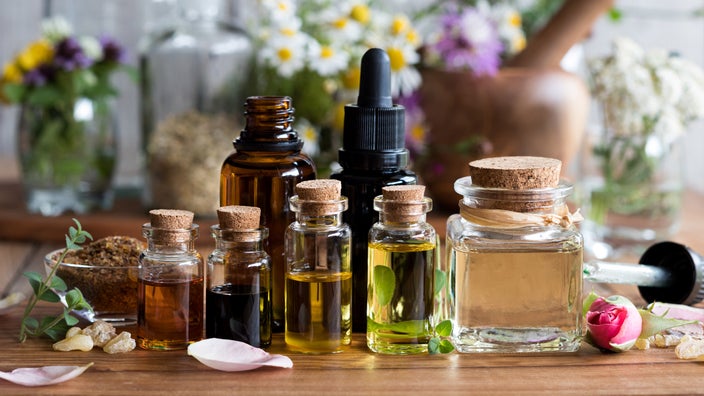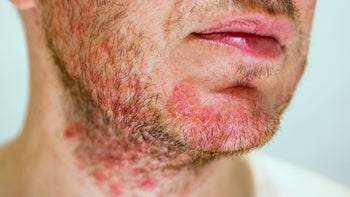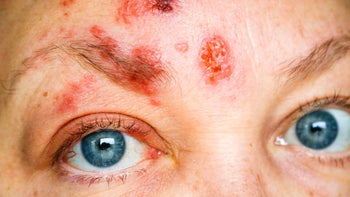
Are Essential Oils Good for Eczema? A Look at 5 of the Most Popular Ones
Key takeaways:
Essential oils are not pure oils. They contain many ingredients that may cause an allergic reaction and worsen eczema.
Essential oils may contain fragrances and other skin allergens. If you have eczema, you should use essential oils with caution.
Coconut oil and sunflower oil may be helpful for eczema. They may work by improving moisture and limiting inflammation in the skin.
Table of contents

Aromatherapy is the use of essential oils inhaled in the air or applied on the skin. The goal is to improve physical and mental well-being. The use of essential oils has become very popular as there has been more focus on using natural products. As a result, many have tried to treat eczema by using essential oils on the skin.
Essential oils can be very helpful for some people. But, it may not always be the best treatment for eczema.
What are essential oils?
Essential oils are oils derived from natural plants. The plants’ leaves, stems, roots, flowers, seeds, and fruits can be used to extract the oil.
Essential oils have been used for centuries for cosmetic and other skin treatments. They have also become trendier for use in detoxing and treating various health conditions.
But it’s important to not confuse the word “essential” with the word “pure.” Essential oils are not pure oils. These oils have been broken down and found to carry hundreds of chemicals.
Because essential oils are not regulated by the FDA, other ingredients are often not listed in the ingredient labels.
Treating hand eczema: Learn the most effective skin care tips to prevent and soothe hand eczema (with pictures).
Hand fungus vs. eczema: Learn how to tell the difference between these two common conditions (with pictures).
Benefits of lavender oil: From stress relief to more restful sleep, read about the different benefits of this popular essential oil.
Can essential oils cure eczema?
No. Essential oils cannot cure eczema. While most uses of essential oils are safe, they can cause significant allergic reactions on the skin. This is especially risky when you have eczema.
When the skin barrier is broken in eczema, the skin cannot protect itself. The broken skin allows more allergens and bacteria to pass in, while losing moisture out of the skin. This leads to dry, irritable, and itchy skin.
When the skin of people with eczema gets exposed to essential oils, it’s prone to developing skin allergies. These allergies are called allergic contact dermatitis.
Allergic contact dermatitis is a reaction by your immune system to a skin allergen. It causes very itchy and irritated skin. Once you develop this type of allergic reaction, you’ll continue to react to the same allergen if you get exposed to it again. Many essential oils have been reported to cause allergic contact dermatitis.
What are popular essential oils used for eczema?
There are several essential oils that people use for eczema. Here are five of the more popular ones.
1. Tea tree oil
Tea tree oil is found in many personal and household products. And it has antibacterial properties. But tea tree oil can also cause skin allergies. In fact, just over 3% of people have an allergy to tea tree oil.
People with eczema have a higher risk of developing skin allergies because their skin barrier is not fully intact. For this reason, the use of tea tree oil should be with caution in eczema-prone skin.
2. Chamomile oil
Chamomile has often been used in aromatherapy for relaxation. Chamomile oil has certain anti-inflammatory effects. Some studies show that this may be helpful for skin inflammation in eczema as well.
But, chamomile oil does contain certain allergens that have been shown to cause allergic contact dermatitis. It should also be used with caution.
3. Peppermint oil
Peppermint oil has been used as a treatment to soothe itchy skin. But the menthol found in peppermint oil can be a skin irritant and an allergen. For this reason, the use of peppermint oil in people with eczema is not recommended.
4. Eucalyptus oil
Eucalyptus oil has shown some potential to lessen inflammation in laboratory studies. But there’s no evidence that eucalyptus oil is helpful in people with eczema.
It too has been shown to cause contact dermatitis and shouldn’t be used as treatment for eczema. There are also reports of possibly toxic effects in adults and children who consumed eucalyptus oil. Rare, but serious side effects of eucalyptus oil can include:
Nausea
Vomiting
Seizures
Death
5. Lavender oil
Lavender oil has been used for aromatherapy for many years. It has also been used to control itchiness and inflammation from eczema. But there’s no clinical evidence to recommend this treatment. Some laboratory studies have shown promise, but more research needs to be done.
There are different types of lavender oil, but they all have one major ingredient called linalool. Linalool is a known skin allergen. One study shows that this is an emerging allergen in more than 10% of children. Lavender should be used with caution especially in those with eczema.
Are any oils good for eczema?
Vegetable oils like virgin coconut oil can be helpful for eczema. Coconut oil can be designated as a “virgin” or pure oil. These oils are processed in a way that preserves the quality of the oil. And that can make the oil less irritating to the skin.
Although olive oil is also a pure oil, it’s not recommended to be used in eczema-prone skin. While it can be somewhat moisturizing, oleic acid in olive oil can sometimes make the skin more inflamed.
Castor oil is another popular option for eczema, but there aren’t studies showing that it works and it can also cause allergic skin reactions.
Here are some oils that may work well for improving skin with eczema.
Coconut oil
Coconut oil is derived from the meat of the coconut. It’s made up of high levels of fats. There are many benefits of coconut oil, especially for eczema. Coconut oil has anti-inflammatory, antibacterial, and moisturizing properties.
The oil helps repair the skin barrier by allowing moisture to stay in to keep eczema skin moisturized. Pure virgin coconut oil has no allergens in it and doesn’t raise the risk of skin allergies. It’s a great natural alternative for skin health.
Safflower seed oil
Safflower seed oil is also made up of various fats. Linoleic acid is one component of safflower oil, which directly helps repair the skin barrier. Safflower oil has been reported to lessen inflammation in the skin.
In one small study of children, those that used safflower oil along with their topical steroid had a great improvement in their eczema. Those who only used their prescriptions showed less improvement.
Sunflower seed oil
Sunflower seed oil is made up mainly of linoleic acid in combination with other types of fats. As mentioned above, the linoleic acid can help improve the skin barrier. Some studies have shown that sunflower oil can help lower inflammation and improve eczema.
How do you safely apply essential oil to skin?
In general, you shouldn’t apply an essential oil directly on the skin without diluting it. Undiluted essential oils are strong, and they could cause a severe skin reaction.
Before using an essential oil, mix it with a carrier oil (like vegetable or coconut oil). To do this, add about 12 drops of the essential oil mixed with 1 oz of carrier oil. Then apply that mixture to a small test area of skin and wait a day to see if you develop a reaction (like an itchy rash) before applying it more broadly.
Is it OK to mix eczema medication with natural treatments?
In general, yes. But, mixing a prescription ointment with any lotion or oil could lower the concentration of the medication.
If you’re trying to decrease the use of your prescription medication, mixing it with another moisturizer can be helpful. Mixing a topical prescription steroid, for example, with a thick moisturizing cream or Vaseline (petroleum jelly) is often done.
One point to remember is that essential oils contain many ingredients. Some may include alcohol or other solvents. When mixed with your prescription, this may actually prevent it from working as it should.
Other oils, like pure virgin coconut oil, may be better mixed with your prescriptions. That’s because they are safe and have beneficial properties for eczema.
When should I talk to a healthcare professional about using essential oils for my eczema?
If you have eczema and are looking for a more natural solution, speaking with a healthcare professional should be the first step. Dermatologists specialize in the treatment of skin conditions. They are familiar with many natural and prescription formulations. Plus, they can help you figure out your risk of exposure to skin allergens.
Frequently asked questions
No. In general, essential oils shouldn’t be used to treat eczema in babies. They have delicate and sensitive skin that’s more likely to get irritated from essential oils.
Essential oils are usually used in concentrations of 2% to 5%. But, some essential oils are more irritating and they need to be even more dilute — as low as 0.5%.
The bottom line
Essential oils for most people will not cause a major problem. But just because the oils smell good and are “natural,” it doesn’t mean they are good for your skin. Many of these oils contain natural fragrances, which are skin irritants and allergens.
When these oils are applied to inflamed skin, like in eczema, they are much more likely to become allergens and irritants. For this reason, people with eczema should talk with a healthcare professional first and use all essential oils with caution.
Why trust our experts?



References
Bingham, L. J., et al. (2019). Contact allergy and allergic contact dermatitis caused by lavender: A retrospective study from an Australian clinic. Contact Dermatitis.
Bleasel, N., et al. (2002). Allergic contact dermatitis following exposure to essential oils. Australian Journal of Dermatology.
Chew, Y. (2019). The beneficial properties of virgin coconut oil in management of atopic dermatitis. Pharmacognosy Reviews.
Crane, M. W. (2021). 6 ways to manage your eczema without breaking the bank. National Eczema Association.
de Groot, A. C., et al. (2016). Tea tree oil: Contact allergy and chemical composition. Contact Dermatitis.
Dontje, A. E. W. K., et al. (2024) The therapeutic potential of essential oils in managing inflammatory skin conditions: A scoping review. Pharmaceuticals.
Elias, P. M., et al. (1980). The permeability barrier in essential fatty acid deficiency: Evidence for a direct role for linoleic acid in barrier function. Journal of Investigative Dermatology.
Elsaie, L. T., et al. (2016). Effectiveness of topical peppermint oil on symptomatic treatment of chronic pruritus. Clinical, Cosmetic and Investigational Dermatology.
Jones, V. A., et al. (2021). Complementary and alternative medicine treatments for common skin diseases: A systematic review and meta-analysis. JAAD International.
Karagounis, T. K., et al. (2018). Use of “natural” oils for moisturization: Review of olive, coconut, and sunflower seed oil. Pediatric Dermatology.
Kumar, K. J., et al. (2015). Eucalyptus oil poisoning. Toxicology International.
Maddocks-Jennings, W. (2004). Critical incident: Idiosyncratic allergic reactions to essential oils. Complementary Therapies in Nursing & Midwifery.
Moustafa, D., et al. (2020). Contact allergy to hydroperoxides of limonene and linalool in a pediatric population. Journal of the American Academy of Dermatology.
Msika, P., et al. (2008). New emollient with topical corticosteroids-sparing effect in treatment of childhood atopic dermatitis: SCORAD and quality of life improvement. Pediatric Dermatology.
National Center for Complementary and Integrative Health. (2020). Aromatherapy.
National Institute of Environmental Health Sciences. (2022). Essential oils.
Paulsen, E., et al. (2008). Airborne contact dermatitis from eucalyptus pulverulenta ‘baby blue’ in a florist. Contact Dermatitis.
Sindle, A., et al. (2021). Art of prevention: Essential oils - natural products not necessarily safe. International Journal of Women’s Dermatology.
U.S. Food and Drug Administration. (2023). Aromatherapy.
Wakelin, S. H., et al. (1996). Contact dermatitis from castor oil in zinc and castor oil cream. Contact Dermatitis.
Wang, W., et al. (2021). The mechanism action of german chamomile (matricaria recutita l.) in the treatment of eczema: Based on dose-effect weight coefficient network pharmacology. Frontiers in Pharmacology.

























